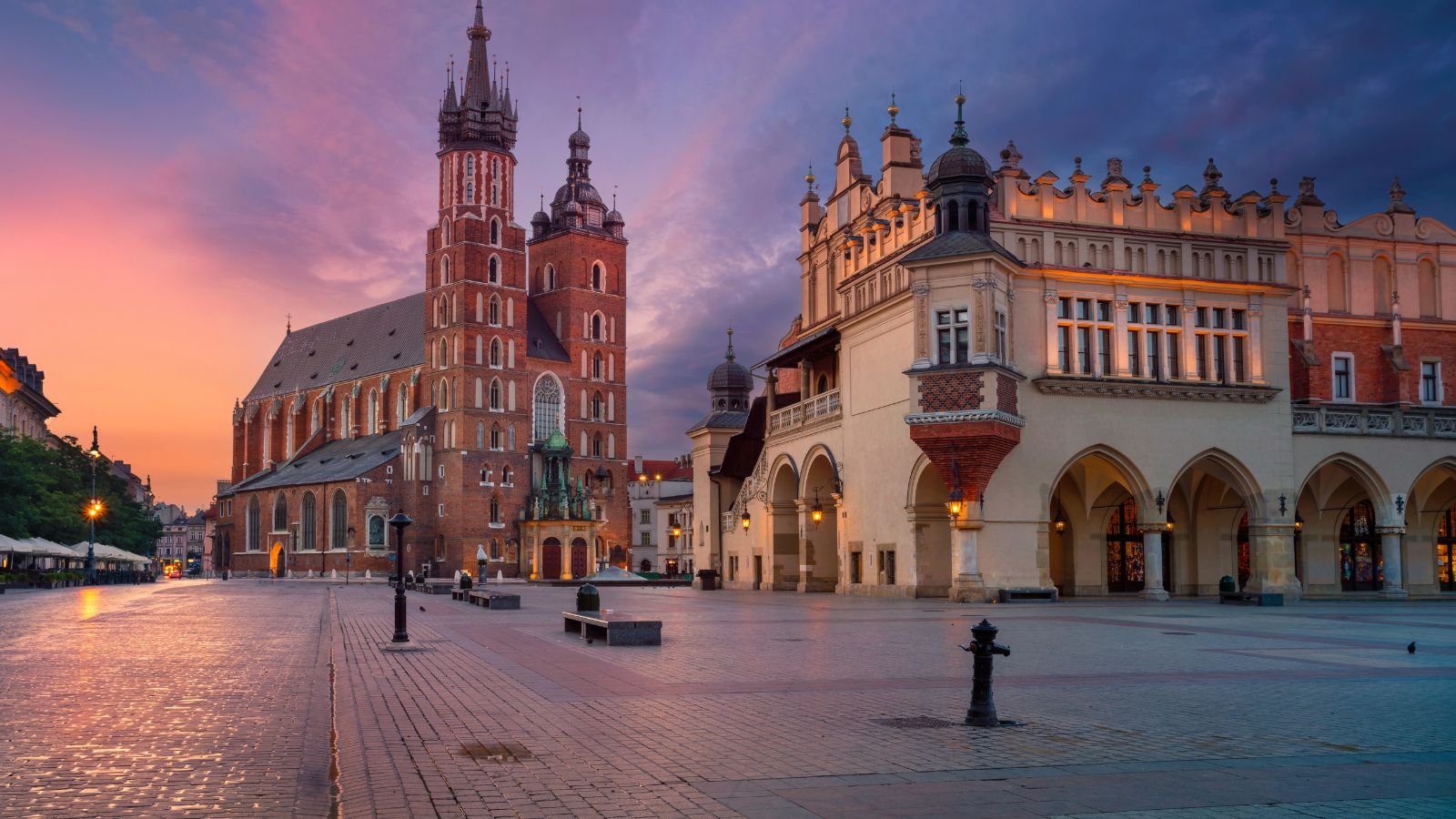48 hours in Krakow is an immersion into a city where medieval history, artistic energy, and a vibrant café culture intertwine effortlessly. Poland’s former royal capital is a place of contrasts—cobbled streets and Gothic spires whisper of centuries past, while a buzzing nightlife and dynamic food scene inject a fresh, modern pulse. Whether drawn by rich heritage, the charm of the old town, or the weight of its historical sites, time here leaves a lasting impression, revealing layers of history, resilience, and contemporary creativity at every turn.
Start 48 hours in Krakow with breakfast at Café Camelot, a charming café in a historic townhouse serving freshly baked pastries and strong Polish coffee. The cosy interior, adorned with vintage décor, sets the perfect tone for a relaxed start to the day. Try a plate of scrambled eggs with smoked Polish sausage or a warm apple strudel. After fuelling up, take a stroll through the magnificent Rynek Główny, the largest medieval market square in Europe. At its centre stands the Cloth Hall, a Renaissance-era trading post now home to artisan shops and an upstairs gallery featuring Polish 19th-century art. Browse for amber jewellery, hand-painted ceramics, or traditional folk art before stepping inside St. Mary’s Basilica to admire its breathtaking blue-and-gold ceiling. Don’t miss the hourly trumpet call from its tower, a centuries-old tradition commemorating the city’s medieval watchmen.
Next, head to Wawel Hill, the heart of Poland’s royal history. Explore Wawel Castle, a stunning mix of Gothic, Renaissance, and Baroque styles, and visit the Royal Chambers to see the lavishly decorated state rooms. Step into the castle’s courtyard, where echoes of Poland’s kings and queens linger in the air, before making your way to Wawel Cathedral. This stunning place of worship is where Polish monarchs were crowned and buried. Descend into the crypts to see the final resting places of national heroes, including Józef Piłsudski, one of Poland’s most revered leaders.
For lunch, walk down to the Kazimierz district, Kraków’s historic Jewish quarter, now a trendy neighbourhood filled with quirky cafés and vintage shops. Stop at Hamsa, a Middle Eastern eatery, for a feast of hummus, falafel, and fresh pita bread, or try traditional Jewish cuisine at Ariel, a restaurant offering dishes like cholent and goose-stuffed pierogi. After lunch, wander through the atmospheric streets, stopping by the Old Synagogue, the oldest surviving synagogue in Poland, and the moving Remuh Cemetery, where ancient tombstones whisper the stories of centuries past.

In the afternoon, take a guided tour of the Oskar Schindler Factory Museum, a deeply moving exhibition about Kraków during World War II and the impact of Schindler’s efforts to save Jewish workers. Walk through immersive displays that transport you to occupied Kraków, offering a powerful glimpse into the resilience of its people. If you have time, cross the river to Podgórze to visit the remnants of the Kraków Ghetto, including the Ghetto Heroes Square and the haunting Eagle Pharmacy, which played a key role in smuggling medicine and aid to ghetto residents.
As the evening approaches, enjoy a drink at Alchemia, a candlelit bar with a bohemian vibe in the heart of Kazimierz. The antique furnishings and dimly lit corners make it one of the most atmospheric spots in the city. For dinner, make your way to Pod Aniołami, a historic restaurant specializing in traditional Polish dishes such as pierogi, roasted duck, and zurek (sour rye soup). If you’re up for a night out, explore Kraków’s legendary cellar bars, where live music and craft beer flow late into the night. Visit Singer for an eclectic experience where guests drink at vintage sewing machine tables, or dive into the buzzing energy of Wódka Café Bar, where an extensive selection of Polish vodkas awaits.
The next morning, start with a visit to Planty Park, a green belt encircling the Old Town where locals take their morning strolls. The park follows the old medieval city walls, offering a peaceful escape before the day’s adventures. Then, head to the Collegium Maius, the oldest building of Jagiellonian University, where Nicolaus Copernicus once studied. Take a guided tour to see the historic lecture halls, astronomical instruments, and an ancient library filled with leather-bound books.
For lunch, grab a bite at Milkbar Tomasza, a modern take on Poland’s communist-era milk bars, serving hearty, home-style food at unbeatable prices. Try the classic schabowy (breaded pork cutlet) with mashed potatoes and pickled cabbage, or opt for placki ziemniaczane, crispy Polish potato pancakes served with sour cream.
Spend the final afternoon of your 48 hours in Krakow with a visit to the MOCAK Museum of Contemporary Art, where cutting-edge exhibitions showcase Poland’s modern artistic talent. Alternatively, take a tram to the historic Nowa Huta district, a planned socialist city from the 1950s, to see an entirely different side of Kraków. Explore the monumental architecture and visit the underground Cold War bunkers, a fascinating relic of Poland’s communist past. If you prefer a more scenic farewell, take a walk along the Vistula River, where cafés and walking paths offer a quiet retreat from the city’s bustling centre.
Before leaving, treat yourself to a last taste of Polish cuisine with a warm obwarzanek (Kraków-style pretzel) from a street vendor, and soak in the city’s lively atmosphere one last time. Visit one of the charming bookstores or pick up a bottle of Polish nalewka (fruit-infused liqueur) as a final souvenir.
As you depart Kraków, you’ll carry with you the echoes of medieval bells, the flavours of traditional Polish dishes, and the city’s undeniable spirit—a place where history and modernity dance together in perfect harmony. The cobbled streets, castle towers, and vibrant squares leave an imprint that lingers, ensuring that this won’t be your last visit to Poland’s most enchanting city.
